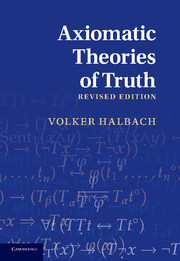Book contents
- Frontmatter
- Contents
- Preface
- Part I Foundations
- Part II Typed truth
- Part III Type-free truth
- 10 Typed and type-free theories of truth
- 11 Reasons against typing
- 12 Axioms and rules
- 13 Axioms for type-free truth
- 14 Classical symmetric truth
- 15 Kripke–Feferman
- 16 Axiomatizing Kripke's theory in partial logic
- 17 Grounded truth
- 18 Alternative evaluation schemata
- 19 Disquotation
- Part IV Ways to the truth
- Index of systems
- Bibliography
- Index
12 - Axioms and rules
from Part III - Type-free truth
Published online by Cambridge University Press: 05 February 2015
- Frontmatter
- Contents
- Preface
- Part I Foundations
- Part II Typed truth
- Part III Type-free truth
- 10 Typed and type-free theories of truth
- 11 Reasons against typing
- 12 Axioms and rules
- 13 Axioms for type-free truth
- 14 Classical symmetric truth
- 15 Kripke–Feferman
- 16 Axiomatizing Kripke's theory in partial logic
- 17 Grounded truth
- 18 Alternative evaluation schemata
- 19 Disquotation
- Part IV Ways to the truth
- Index of systems
- Bibliography
- Index
Summary
When browsing through various papers on axiomatic theories of truth, one may get the impression that the goal is to find a combination of attractive axioms and rules of inference that can be combined without rendering the system inconsistent, that is, at least when the systems are formulated in classical logic, without rendering the system inconsistent.
The axioms and rules can only be evaluated against the background of a base theory and base logic, and only in combination with the other proposed axioms and rules. I think a holistic approach to judging axiomatic systems for truth is preferable to a piecemeal treatment where one tries to evaluate axioms and rules separately and then tries to combine as many desirable rules and axioms as possible, or where one tries to optimize some kind of degree of desirability where one starts by scoring each proposed truth-theoretic axiom and rule only against a background logic or the background of a certain base theory without other axioms for truth. Only in connection with a specific logic, a specific base theory, and a set of other axioms and rules for truth, can a candidate axiom for truth be evaluated.
- Type
- Chapter
- Information
- Axiomatic Theories of Truth , pp. 135 - 137Publisher: Cambridge University PressPrint publication year: 2014

